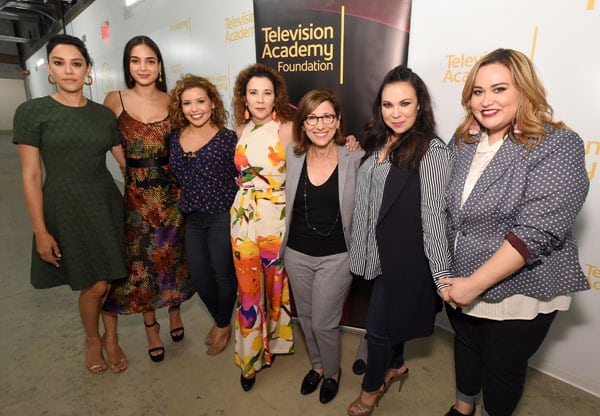
August 21, 2018; Variety
The Television Academy Foundation (TAF) was started in 1959, dedicated to engaging and educating the next generation of television professionals. As the charitable arm of the Television Academy (famous for the Emmy Awards) the Foundation has not always been in the spotlight, but thanks in part to new investment in old traditions, the Foundation is enjoying a popular renaissance.
The TAF organizes its programs into five pillars, which include The Interviews: An Oral History of Television, the Internship Program, the College Television Awards, the Visiting Professionals Program, and the Faculty Seminar. The success of the revamped Interviews Initiative represents TAF’s determination to overcome a classic struggle of those involved in the preservation and celebration of history: having important and valuable content to share, but lacking the capacity or a platform for effective distribution.
Technology-based solutions have been key to the site’s newfound popularly, according to foundation chair Madeline Di Nonno. The bank of interviews numbers about 900 (dating back to the 1940s) and it is now fully searchable, as well as free and accessible to the public.
While the Interviews Initiative is generating the most public attention and social media buzz, the Foundation has also been revitalized by the mainstream debate over the lack of representation of women and people of color in films and television. The data show the problem is severe, with one example being the 2018 Annenberg Inclusion Initiative study Inequality in 1,100 Popular Films, which paints a dismal picture for the industry:
In 2017, 43 films did not depict one Black female character, 64 were missing even one Latina, and 65 did not include an Asian female speaking character. Coupled with the fact that 78 movies did not feature a female character with a disability and 94 were devoid of an LGBT female, this analysis reveals how many of our most popular films keep women from marginalized groups out of the picture.
Di Nonno is hopeful that their targeted investments in youth and people of color will deliver real change. “We have a very keen eye on making sure our interns are intersectional,” Di Nonno says. “The storytellers behind the camera drive the stories that are being told onscreen, so it’s really important that as we look at who are the leaders [are], we need to identify and engage and harness [them] into the industry.”
Sign up for our free newsletters
Subscribe to NPQ's newsletters to have our top stories delivered directly to your inbox.
By signing up, you agree to our privacy policy and terms of use, and to receive messages from NPQ and our partners.
The College Television Awards has expanded beyond traditional thinking about inclusion (often limited to gender and race) through the introduction of the Loreen Arbus Focus on Disability Award. In so doing, it joins with efforts of the Ruderman Family Foundation, a leading disability rights advocate in the field. A couple of years ago, Ruderman supported a study that “revealed that 95 percent of roles depicting someone with a disability on the top 10 TV shows were played by actors without disabilities.”
For TAF, presenting the Disability Award to Ying Lu at the 2017 CTA ceremony, actor Josh Feldman clarified the current challenge with respect to casting opportunities for artists with disabilities:
We don’t [only] want to audition for roles that are the deaf girl or the deaf guy, we want to try out for roles of scientist, lawyers, politicians, bad guys, good guys, wives, husbands, these are roles that people with disabilities can play, just like everybody else.
The use of star power to advance an agenda is an obvious choice for the Television Academy Foundation, and executive director Jodi Delaney, at the helm for most of the recent changes, has upped the Foundation’s social media game to help make the connection between what viewers see on their screens, and how the TAF contributes to both the on-screen and behind-the-scenes talent. In a recent tweet, she proudly hailed the addition of Benito Martinez, star of American Crime and The Shield, to the TAF board, which also includes producer Kevin Hamburger (The Talk and Ellen) and network executive Deborah Bradley (TBS and TNT).
Along with reorganizing the organization’s activities and communications, the inner workings of the Foundation have also undergone significant change, as reflected in the choice of Delaney, now just over a year into her mandate. Delaney has experience in the arts, but also brings a significant nonprofit management and social change dimension to the role. As Di Nonno said in last year’s press release, “With her expertise in the nonprofit, education, entertainment and business worlds, Jodi is the ideal match for the executive director role.”
While the popularity of the interview project and its newfound accessibility has raised the profile of the modernized TAF, it is the investment in education, development, and advocacy for improved inclusion and diversity that will ultimately determine the Foundation’s mission-oriented success. Early results seem promising: the internship class of 2018 features a membership that the Foundation says about 60 percent are people of color and 74 percent are women.
The core strategy—to encourage engagement and support success for underrepresented populations—seems as obvious as it is sound. Given the abysmal state of the industry as revealed in the Annenberg study, it will be up to the next generation to take equity, inclusion, and diversity in Hollywood from science fiction to non-fiction.—Keenan Wellar













